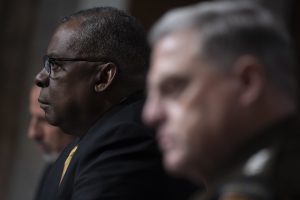As the United States and China vie to establish new partnerships and expand influence with Asia-Pacific nations, the top defense officials from both countries are trying to win support from their regional counterparts, diplomats, and leaders at a security forum in Singapore.
Australian Prime Minister Anthony Albanese, whose country is a stalwart U.S. ally in the Pacific, gave the keynote address Friday evening to open the dialogue at the Shangri-La Hotel hosted by the International Institute for Strategic Studies think tank.
Albanese, whose country has angered Beijing with its agreement with the U.K. and U.S., known as AUKUS, to obtain nuclear-powered submarines to address the perceived rising threat from China, focused on Australia’s deepening engagement, as well as “shared opportunities and challenges” in the region.
“We want a region that is stable, peaceful, resilient, and prosperous,” he said when his speech was announced.
Ahead of his speech, Albanese met with Singapore’s Deputy Prime Minister Lawrence Wong and told reporters that the strong ties between the two countries was important because “security isn’t just about defense.”
“It’s also about our capacity to be less vulnerable to shocks, whether that’s a future pandemic, a trade or cyber security shock, or international conflict,” he said.
Wong stressed that none of the Association of Southeast Asian Nations wanted to have to choose between Washington or Beijing.
“No one wants to be in a position where we have to either contain China’s rise or limit America’s presence,” he said. “Any move in either direction will have few takers in the region because no one in ASEAN wants to see a new Cold War.”
This year’s dialogue comes amid a wide range of issues, such as the war in Ukraine and its regional implications, including China’s support for Russia, the ongoing conflict in Myanmar, and growing tensions between China and the United States and its allies over Beijing’s claim to the self-governing island of Taiwan.
U.S. Secretary of Defense Lloyd Austin will open the day Saturday with an address on U.S. “leadership in the Indo-Pacific,” according to the Pentagon, while China’s new defense minister, Li Shangfu, leads off the day Sunday with a speech on his country’s new security initiatives.
Austin began his trip to the region in Japan, whose prime minister, Kishida Fumio, has been one of the most outspoken leaders in Asia against the Russian invasion of Ukraine.
Kishida has ramped up Japan’s defense spending, and cautioned others at the Shangri-La forum last year that “Ukraine today may be East Asia tomorrow.”
China has refused to criticize Russia’s invasion of Ukraine and has blamed the U.S. and NATO for provoking Moscow. During a trip in April to Moscow, Li pledged to expand military cooperation, military-technical ties and the arms trade with Russia.
“We will certainly take them to a new level,” he said at the time.
On the sidelines of the conference in Singapore, Austin plans to meet with “key leaders to advance U.S. defense partnerships across the region in support of our shared vision for a free and open Indo-Pacific anchored in ASEAN centrality,” the Defense Department said.
Following the conference, Austin travels to New Delhi to meet with his Indian counterpart for talks on issues including expanding “operational cooperation between the U.S. and Indian militaries.”
Like the United States, many of its allies have been increasing their focus on the Indo-Pacific, and the conference brings together many other top officials, including defense ministers from Britain, Germany, Sweden, Canada, the Netherlands, Japan, South Korea, Australia, and New Zealand. Ukraine’s defense minister is also expected to attend.
Austin asked Li to meet with him in Singapore, but China turned down the request, Pentagon press secretary Brig. Gen. Pat Ryder told reporters in Washington.
“The department believes strongly in the importance of maintaining open lines of military-to-military communication between Washington and Beijing to ensure that competition does not veer into conflict,” he said.
Li, a general who was named defense minister in March, is under American sanctions that were imposed in 2018 over Li’s involvement in China’s purchase of combat aircraft and anti-aircraft missiles from Moscow.
The sanctions, which broadly prevent Li from doing business in the United States, do not prevent him from holding official talks, Ryder said.
Chinese Defense Ministry spokesperson Tan Kefei said Austin’s offer of talks in Singapore was rejected because the U.S. “disregards China’s concerns and creates artificial obstacles.”
“The U.S. side should take practical actions to show sincerity and correct mistakes, so as to create the necessary conditions and proper atmosphere for communication and exchange between the two sides,” he said, while not mentioning the sanctions or other issues directly.
Even before Li’s appointment, multiple Defense Department requests for talks involving key leaders were rejected, with more than a dozen requests having gone unanswered or declined since 2021, according to a senior U.S. defense official who spoke on condition of anonymity to provide information on private discussions.
In Japan on Thursday, Austin stressed the need for regular communications and open channels, noting a recent incident in which a Chinese fighter jet flew aggressively close to an American reconnaissance plane over the South China Sea.
“I’m concerned about at some point having an incident that could very, very quickly spiral out of control,” Austin said. “I would welcome any opportunity to engage with leadership.”
Despite Li’s refusal of the invitation, China might not want to be seen as the non-communicative party in regional eyes so some sort of bilateral talks could still take place over the course of the weekend, said Euan Graham, senior fellow for Indo-Pacific Defense and Strategy with IISS.
“I wouldn’t rule out a U.S.-China meeting yet,” he said.
Austin and Li were captured on camera briefly shaking hands and exchanging pleasantries at the opening night dinner. Ryder, the Pentagon press secretary, acknowledged the interaction but said the two men “did not have a substantive exchange.”

































